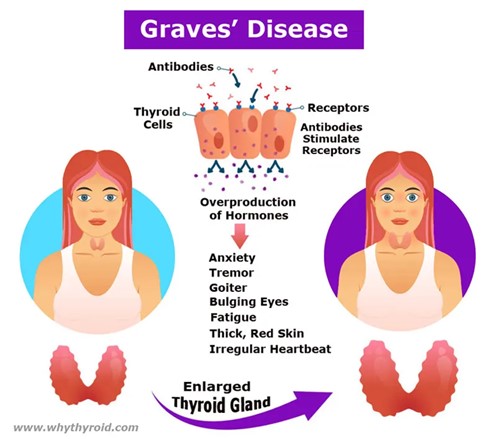A nurse is assessing an adolescent who has an exacerbation of Graves' disease (Hyperthyroidism). Which of the following findings should the nurse expect?
Heat intolerance
Weight gain
Bradycardia
Lethargy
The Correct Answer is A
A) Heat intolerance.
Explanation: This statement is true. Heat intolerance is a common symptom of hyperthyroidism, including Graves' disease. People with hyperthyroidism often have an overactive thyroid gland that produces an excessive amount of thyroid hormones. This can lead to an increased metabolic rate, which in turn makes them sensitive to heat. They may feel excessively warm, sweat more than usual, and have difficulty tolerating hot weather.
B) Weight gain.
Explanation: This statement is false. Weight gain is not a typical finding in Graves' disease or hyperthyroidism. In fact, one of the hallmark symptoms of hyperthyroidism is unexplained weight loss despite increased appetite. The elevated levels of thyroid hormones cause an increase in metabolism, leading to weight loss.
C) Bradycardia.
Explanation: This statement is false. Bradycardia refers to an abnormally slow heart rate, typically below 60 beats per minute. In hyperthyroidism, the heart rate is often elevated rather than slowed down. The excessive thyroid hormones can lead to an increased heart rate (tachycardia) and palpitations. It's important to note that if the question were about hypothyroidism (underactive thyroid), bradycardia might be more relevant.
D) Lethargy.
Explanation: This statement is false. Lethargy, or a state of extreme tiredness and lack of energy, is more commonly associated with hypothyroidism (underactive thyroid) rather than hyperthyroidism. Hyperthyroidism usually leads to symptoms of increased energy, restlessness, and hyperactivity due to the elevated metabolic rate caused by excess thyroid hormones.

Nursing Test Bank
Naxlex Comprehensive Predictor Exams
Related Questions
Correct Answer is C
Explanation
A. Always infantize the child
Incorrect Explanation: "Infantizing" a child with a growth hormone deficiency is not a relevant or appropriate approach.
Explanation: Growth hormone deficiency is a medical condition that affects a child's growth. Treating the child as an infant could potentially have negative psychological and social effects. It's important to provide appropriate support and understanding without treating the child differently due to their medical condition.
B. Monitor for leukemia
Incorrect Explanation: Monitoring for leukemia is not directly related to growth hormone deficiency.
Explanation: Growth hormone deficiency primarily affects a child's growth and development due to inadequate production of growth hormone. While there might be certain health concerns associated with the condition, monitoring for leukemia is not a common aspect of managing growth hormone deficiency.
C. Help the parents set realistic goals based on the child's age and abilities
Correct Explanation: This is an important aspect to include in teaching.
Explanation: When a child is diagnosed with growth hormone deficiency, it's crucial for parents to set realistic expectations regarding their child's growth. Growth hormone therapy can help, but it's essential to understand that the child's growth might still differ from their peers. Setting realistic goals based on the child's age and abilities can help manage expectations and provide appropriate support.
D. This illness is only seen in males
Incorrect Explanation: Growth hormone deficiency is not limited to males.
Explanation: Growth hormone deficiency can affect individuals of any gender. It is not exclusive to males. The condition results from insufficient production of growth hormone by the pituitary gland, and it can occur in both males and females.
Correct Answer is C
Explanation
A. Place a pillow under the child's head.
Explanation: While providing comfort is important, the priority in this scenario is to ensure the child's safety. Placing a pillow under the head can be considered after addressing immediate safety concerns.
B. Clear the area of hazards.
Explanation: Correct Choice. Ensuring the area is clear of hazards is the nurse's priority. During a seizure, the child can experience uncontrolled movements, and having hazards around can lead to injuries. Clearing the area helps prevent harm. But priority is to position the child side lying.
C. Position the child side-lying.
Explanation: Correct Choice. Placing the child in a side-lying position helps prevent choking and aspiration due to vomiting during the seizure. It also minimizes the risk of airway obstruction and helps manage secretions.
D. Loosen restrictive clothing.
Explanation: While loosening restrictive clothing can facilitate breathing, the priority in this situation is addressing safety concerns related to the seizure and vomiting. Ensuring a clear and safe environment takes precedence.
Whether you are a student looking to ace your exams or a practicing nurse seeking to enhance your expertise , our nursing education contents will empower you with the confidence and competence to make a difference in the lives of patients and become a respected leader in the healthcare field.
Visit Naxlex, invest in your future and unlock endless possibilities with our unparalleled nursing education contents today
Report Wrong Answer on the Current Question
Do you disagree with the answer? If yes, what is your expected answer? Explain.
Kindly be descriptive with the issue you are facing.
